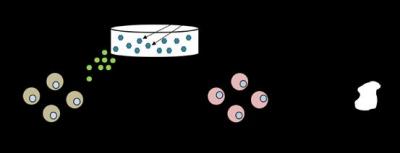
Cell-based cancer immunotherapy involves modification of immune cells ex vivo and subsequent infusion; this is referred as adoptive cell transfer (ACT) therapy. However, poor survival and persistence of infused immune cells limit its efficacy treatment. Our lab with has expertise in developing 3D hydrogel systems and is trying to utilise these hydrogels for in vivo gene delivery, thereby, overcoming problems pertaining to ACT.Gene delivery vectors can be encapsulated in a 3D hydrogel and released in a sustained and localised manner leading to programming of desired cells in situ. Further, chemokine mediated immune cells recruitment combined with sustained release of gene delivery vectors, can fine tune the efficiency of cellular reprogramming. Both in vitro and in vivo immune cell recruitment studies have shown that chemokine loaded hydrogels can recruit immune cells and we have also seen hydrogel mediated modification of immune cells. We are currently studying simultaneous recruitment and modification of immune cells via hydrogels in a mice model. Our study will help in developing an alternative method for ACT which could address some of the challenges encountered from adverse systemic effects caused by bolus infusion of engineered cells or gene delivery vectors.
Prof. Prakriti Tayalia
